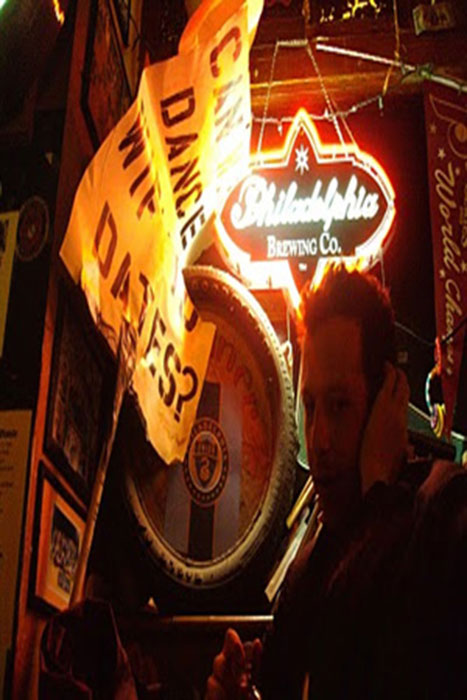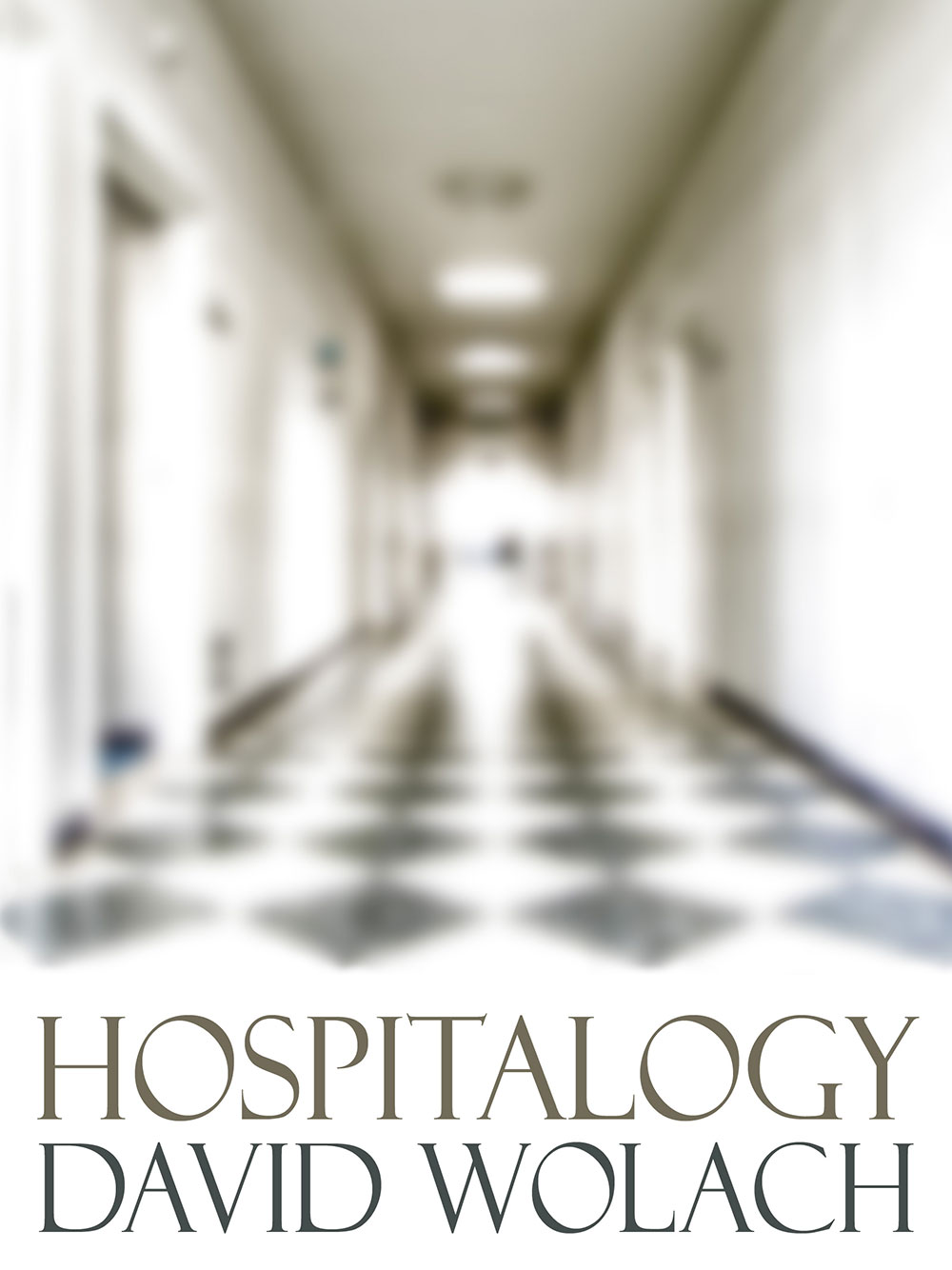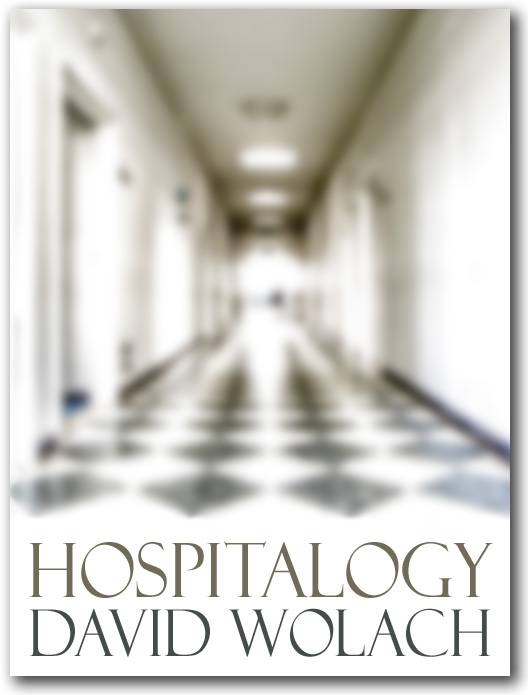david woloch
david wolach is founding editor of Wheelhouse Magazine & Press and has been an active participant in Nonsite Collective. wolach is the author of Hospitalogy, from Tarpaulin Sky Press, as well as Occultations (Black Radish Books, 2010), Prefab Eulogies Volume 1: Nothings Houses (BlazeVox [books], 2010), and book alter(ed)(Ungovernable Press, 2009). A former union organizer and installation artist, wolach’s work often begins as site-specific and interactive performance and ends up as shaped, written language. Critical work on the poetics of spatial practice can be found in Aufgabe, P-Queue, Jacket and Sibila: Poesia y Cultura. Current work includes collaboration with composer Arun Chandra on a 4-channel sound-text composition for four voices, a set of pieces which includes “modular arterial cacophony” from Occultations, and a series of essays on labor organizing in Detroit amidst the headwind of the Right To Work Committee’s union-busting rhetorical strategy. wolach is professor of poetry, poetics, and queer & cultural theory at The Evergreen State College, and visiting professor in Bard College’s Workshop In Language & Thinking.


david woloch
david wolach is founding editor of Wheelhouse Magazine & Press and has been an active participant in Nonsite Collective. wolach is the author of Hospitalogy, from Tarpaulin Sky Press, as well as Occultations (Black Radish Books, 2010), Prefab Eulogies Volume 1: Nothings Houses (BlazeVox [books], 2010), and book alter(ed)(Ungovernable Press, 2009). A former union organizer and installation artist, wolach’s work often begins as site-specific and interactive performance and ends up as shaped, written language. Critical work on the poetics of spatial practice can be found in Aufgabe, P-Queue, Jacket and Sibila: Poesia y Cultura. Current work includes collaboration with composer Arun Chandra on a 4-channel sound-text composition for four voices, a set of pieces which includes “modular arterial cacophony” from Occultations, and a series of essays on labor organizing in Detroit amidst the headwind of the Right To Work Committee’s union-busting rhetorical strategy. wolach is professor of poetry, poetics, and queer & cultural theory at The Evergreen State College, and visiting professor in Bard College’s Workshop In Language & Thinking.
Writing from what Frank Sherlock calls a “genderqueer nomadism,” david wolach’s Hospitalogy traces living forms of intimate and militant listening within the Hospital Industrial Complex—hospitals, medical clinics and neighboring motels. The book of poems and short essay performs a sociopoetic surgerythat is exploratory, not curative, on the institutional sites of contestation that wolach is writing (and reading) from within. But Hospitalogy is not performing diagnostic work; is singing back the sounds of places upon a body, faint as they often are at the edges of the “dark hospital precipice.” The poems and essay in Hospitalogy question whether the patient, gathering selfhood into a temporary-instrumental (w)hole is the sounding of a terrible ecosystem, not merely the image of an individual in abject repose. Figuring and de-figuring illness in relation to Fred Moten’s concept of “manufactured crisis” and Eleni Stecopoulos’s reminder that illness is sociopathic not idiopathic, Hospitalogy unfolds from inside institutions where selves get constituted through the forced acknowledgment of the invention of their impoverished constitution. In Erica Kaufman’s words, this is “procedural anatomic work, queer narrativity,” in which one senses that to become ill, sick, “disabled” is to be shifted into (if one is not already put in the place of having been shifted) an “embodied” subject-object position, to sense that one is perhaps their body, or some-body, even where what or whether that means is utterly in question.

Writing from what Frank Sherlock calls a “genderqueer nomadism,” david wolach’s Hospitalogy traces living forms of intimate and militant listening within the Hospital Industrial Complex—hospitals, medical clinics and neighboring motels. The book of poems and short essay performs a sociopoetic surgerythat is exploratory, not curative, on the institutional sites of contestation that wolach is writing (and reading) from within. But Hospitalogy is not performing diagnostic work; is singing back the sounds of places upon a body, faint as they often are at the edges of the “dark hospital precipice.” The poems and essay in Hospitalogy question whether the patient, gathering selfhood into a temporary-instrumental (w)hole is the sounding of a terrible ecosystem, not merely the image of an individual in abject repose. Figuring and de-figuring illness in relation to Fred Moten’s concept of “manufactured crisis” and Eleni Stecopoulos’s reminder that illness is sociopathic not idiopathic, Hospitalogy unfolds from inside institutions where selves get constituted through the forced acknowledgment of the invention of their impoverished constitution. In Erica Kaufman’s words, this is “procedural anatomic work, queer narrativity,” in which one senses that to become ill, sick, “disabled” is to be shifted into (if one is not already put in the place of having been shifted) an “embodied” subject-object position, to sense that one is perhaps their body, or some-body, even where what or whether that means is utterly in question.
david wolach’s Hospitalogy is an extraordinary work that takes us into the complex guts of the “hospital-hotel complex.” Here the body rebels, redacts, pulls, and sings between patient and patient. wolach performs a radical somatics, procedural anatomic work, queer narrativity—where “the written is explored as catastrophe and its aftermath.” Just as kari edwards writes, “identity becomes as indeterminate as the narrative,” wolach works with site-specific indeterminacy, enacting at the start a series of intimate letters between, among other things, “timed blast incessant quest,” and “dear alarm,” “dear accident.” It’s no coincidence that one (early) definition of “hospital” is to denote a place for the “reception and entertainment of travelers and strangers” because Hospitalogyreminds readers that even when “visibly and markedly indecipherable,” with an active and activist I/eye, collaboration and conversation can reclaim any space. I am thankful for this book. (Erica Kaufman) When poetry comes—as the strange tearing apart held inside that holds you inside, singing static and shrapnel through enclosure; as when one says ah, my dear, or come and taste my meat, or come in, come in; as the outside comes in, in love, as the enemy of all, unsealing every single body—poetry comes “to bevel the air” and “read sutures” with a terrible, absolute rub. Dear “lucidbranching,” Dear “distractionary quickie,” Dear “groundwater,” Dear “jesus of the pain.” Welcome to david wolach’s beautiful corrosion, Hospitalogy. (Fred Moten) To be removed from time. To be held no place. To leave home yet remain locked in the ports and aporias through which one’s body is occupied. At a time when hospitality is increasingly deployed to sterilize policies of deportation and incarceration (witness Bush’s “guest workers” and the Greek state’s “Operation Xenios Zeus”), david wolach performs the common detention of patients, workers, and other undesirables in “places of liquidation.” What Artaud called impouvoir (dis-ability or un-power) resounds in those “codes and silences,” acronyms, truncations, and compressions that leave us no room to live or die—“As if / To endure / The language / Is a cure…” Hospitalogy asks how holding spaces become healing spaces, not despite but because of their toxicity. This book holds the space of the clinic we don’t yet have, the dark we need, the chronic we might dream rather than undergo. (Eleni Stecopoulos) david wolach’s Hospitalogy is a place of genderqueer nomadism within the rubric of the Hospital Industrial Complex. There are poems composed in the intimate confines of MRI machines. There are poems composed in motel rooms. They move between and within, considering that “middle zone” between “distraction and contraction.” While much of Hospitalogy takes place in bed, the body is in movement from place to place, “cut & pasted” as a “depreciable asset”—a site of objection and subjection. The “corporate body modification of mortality” is the problem, each patient an ecosystem vulnerable to disaster. The weakened antibodies of the individual, the poisoned Gulf of Mexico, the torn New Orleans, and the deforested Haiti are interconnected by abuses of sustainable balance. This is a book that documents the soft rebellion of staying alive, articulating the transition from invisibility to indecipherability. In “Hospitalogy: Insurances for Cartesian Layaway” a dream reveals the bed’s underside graffiti: ADELARD OF BATH WAS HERE. This interrogation of embodiness convinces us to reach into to our own wounds, rife with language as “a future misunderstanding.” For those brave enough to discover an open secret, that the indecipherable has room for a potential radical break—look under the bed and see DAVID WOLACH WAS HERE. (Frank Sherlock)
david wolach’s Hospitalogy is an extraordinary work that takes us into the complex guts of the “hospital-hotel complex.” Here the body rebels, redacts, pulls, and sings between patient and patient. wolach performs a radical somatics, procedural anatomic work, queer narrativity—where “the written is explored as catastrophe and its aftermath.” Just as kari edwards writes, “identity becomes as indeterminate as the narrative,” wolach works with site-specific indeterminacy, enacting at the start a series of intimate letters between, among other things, “timed blast incessant quest,” and “dear alarm,” “dear accident.” It’s no coincidence that one (early) definition of “hospital” is to denote a place for the “reception and entertainment of travelers and strangers” because Hospitalogyreminds readers that even when “visibly and markedly indecipherable,” with an active and activist I/eye, collaboration and conversation can reclaim any space. I am thankful for this book. (Erica Kaufman) When poetry comes—as the strange tearing apart held inside that holds you inside, singing static and shrapnel through enclosure; as when one says ah, my dear, or come and taste my meat, or come in, come in; as the outside comes in, in love, as the enemy of all, unsealing every single body—poetry comes “to bevel the air” and “read sutures” with a terrible, absolute rub. Dear “lucidbranching,” Dear “distractionary quickie,” Dear “groundwater,” Dear “jesus of the pain.” Welcome to david wolach’s beautiful corrosion, Hospitalogy. (Fred Moten) To be removed from time. To be held no place. To leave home yet remain locked in the ports and aporias through which one’s body is occupied. At a time when hospitality is increasingly deployed to sterilize policies of deportation and incarceration (witness Bush’s “guest workers” and the Greek state’s “Operation Xenios Zeus”), david wolach performs the common detention of patients, workers, and other undesirables in “places of liquidation.” What Artaud called impouvoir (dis-ability or un-power) resounds in those “codes and silences,” acronyms, truncations, and compressions that leave us no room to live or die—“As if / To endure / The language / Is a cure…” Hospitalogy asks how holding spaces become healing spaces, not despite but because of their toxicity. This book holds the space of the clinic we don’t yet have, the dark we need, the chronic we might dream rather than undergo. (Eleni Stecopoulos) david wolach’s Hospitalogy is a place of genderqueer nomadism within the rubric of the Hospital Industrial Complex. There are poems composed in the intimate confines of MRI machines. There are poems composed in motel rooms. They move between and within, considering that “middle zone” between “distraction and contraction.” While much of Hospitalogy takes place in bed, the body is in movement from place to place, “cut & pasted” as a “depreciable asset”—a site of objection and subjection. The “corporate body modification of mortality” is the problem, each patient an ecosystem vulnerable to disaster. The weakened antibodies of the individual, the poisoned Gulf of Mexico, the torn New Orleans, and the deforested Haiti are interconnected by abuses of sustainable balance. This is a book that documents the soft rebellion of staying alive, articulating the transition from invisibility to indecipherability. In “Hospitalogy: Insurances for Cartesian Layaway” a dream reveals the bed’s underside graffiti: ADELARD OF BATH WAS HERE. This interrogation of embodiness convinces us to reach into to our own wounds, rife with language as “a future misunderstanding.” For those brave enough to discover an open secret, that the indecipherable has room for a potential radical break—look under the bed and see DAVID WOLACH WAS HERE. (Frank Sherlock)

